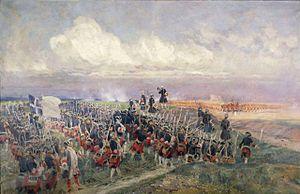
Captain Richard Avery Hornsby ( -1819) is a British military figure from the 18th century. He became famous after taking on a boat full of French pirates and ending up victorious.
Adventures on the high seas
It was the height of the War of the Austrian Succession when Richard Avery Hornsby, who lived in Sunderland’s Vine Street, set off for The Hague on his brig, the Wrightson and Isabella.
His little ship was laden with malt and barley for the voyage and he had a crew of just five men and two boys. Such was the routine nature of the trip, that the Isabella was built for speed rather than battle, boasting just four small guns, two swivel cannons and a few blunderbusses.
With such poor defences, she might appeared an easy target to the 75 French pirates on board the Marquis of Brancas, who spotted her off the Dutch coast and then engaged the Wrightson and Isabella in combat on 13 June 1744. The Brancas’ ten guns, eight swivel cannons and 300 small arms were defeated by Hornsby and his crew after an hour of battle. Twice the enemy tried to board the Isabella but were unsuccessful.
A shot from the British side eventually caused the Brancas to sheer off, giving Hornsby a chance to put the tattered Union flag back up. Then, thinking the French had given up the fight, he led his shattered crew into giving the pirates three rousing cheers. But the pirates were not yet defeated and, as the cheers faded, so the Brancas returned – firing a volley of shots into the Isabella.
Wounded in the temple and “bleeding profusely,” Hornsby refused to give in and, once again, called his crew to arms. Three broadside shots were then fired at the Isabella, but the British returned the fire with equal ferocity. Once again the French ship drew alongside the British brig, but this time the pirates refused their captain’s demands to go aboard and face Hornsby.
Eventually admitting defeat, the French captain cut the lashings and started to sail away – only for his ship to blow up just seconds later. The tiny British merchant ship had taken on and sunk a formidable fighting ship. Brancas was now lying at the bottom of the sea. Of the 75 pirate sailors on board, 36 were killed or wounded in battle and all but three drowned when it sank.
Hornsby was later awarded a gold medal and chain worth £100 for his bravery by King George II, at a ceremony held at Kensington Palace in September 1744. Each of his men – all from Sunderland – were given a bounty of £5, while 40 shillings was awarded to the boys in his crew.
It was thought that Captain Hornsby was buried in St Michael & All Angels Churchyard, Houghton-le-Spring, near Sunderland; however, a search of the burial registers by local historian Paul Lanagan revealed that the Richard Hornsby buried in the churchyard had died in 1818 aged 67, meaning he would have been 7 years old at the time of the pirate incident.
Old Song
An old song written in praise of Hornsby, called Brave Captain Hornsby:
There is an old proverb I've lately thought on,
'When you think of a friend you're sure to find none';
For when that I thought to see Lestock come by,
He was five miles a distance, and would not come nigh;
But for all that misfortune, we never could start,
We pursued after them with a true British heart.
A mile's distance next day, they at us did fire,
But in half an hour we to them drew nigher,
Until that we came within pistol-shot,
Then we did let fly ; and why should we not ?
As we sent 'em one broadside, another did come,
Which made our cannons to play, bomb ! bomb !
Our admiral then took his glass in his hand,
To espy what he could, as you shall understand;
A double shot came unto him so nigh,
That it took off the place where his arm did lye.
But for that misfortune, and all that foul play,
He held 'em six hours in hot battle that day.
The night being come, they straightway gave o'er,
And went off with their cripples; we see 'em no more.
But now that the war is proclaim'd against France,
When we see them again we will make 'em to prance;
And if ever they into our presence do come,
We will make our cannons play ' Britons, strike home.'
Then straightway we left them in grief to complain,
Whilst we are carousing along the salt main.
Pray God bless our fleet, and his Majesty too,
And grant them success wherever they go.
Concluding as this, and my song to end,
In Matthews' brave ship these verses were penn'd.
Naval Songs & Ballads (book): Link to this ballad: [1]
A slightly newer song in his praise: In Praise of Brave Captain Hornsby
Come all you brave sailors that plough on the main,
And hear of the brave Captain Hornsby by name;
How bravely he acted and play'd his own part,
That he made the proud Frenchmen to quake in their hearts.
Link to this ballad: [2]
References
- The History of the Town and Port of Sunderland, by James Burnett. Published in 1830. [3]
- The Local Historian's Table Book of Remarkable Occurrences, by Moses Aaron Richardson. [4]